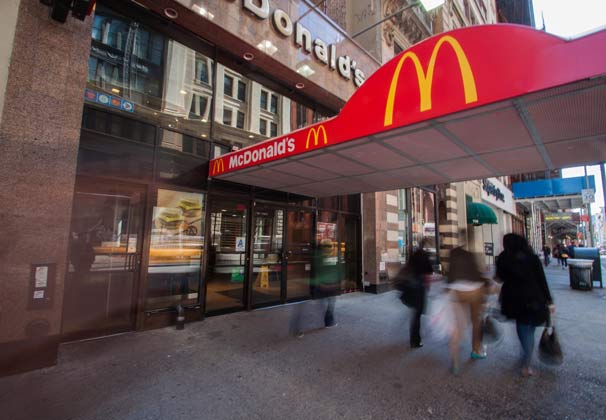
Nearly 400 New York City fast food
workers picked up picket signs to participate in one of the largest strikes in city history. The workers marched and chanted for an increased minimum wage, union rights and better treatment.
The April 4 strike was an initiative by the Fast Food Forward Campaign. The organizers included New York Communities for Change, United NY and the Black Institute, and was backed by the Service Employees International Union. The workers’ campaign was also supported by community groups, clergy, elected officials and civic leaders.
The number of participants in the recent protest doubled from the group’s first strike last November, which gathered 200 workers.
The New York Communities for Change said they selected April 4 as the date of the strike because of its historical significance and relevance to the plight of fast food workers. On the same day in 1968 Martin Luther King Jr. was assassinated during a visit to Memphis, Tenn., in support of striking sanitation workers.
Though New York City’s minimum wage is already set to gradually increase to $9 over the next three years, workers say that that is not enough.
Jonathan Westin, director of Fast Food Forward, said giving fast food workers a wage of $15 an hour and allowing them to establish a union would not only benefit the economy but will also help rebuild the middle class.
“It’s a wage that will allow them to cover their basic needs and help lift our entire economy … the protection of a contract will prevent companies from the unlawful treatment and manipulation of hours that has come to define too many American jobs,” Westin said.
Tim McIntyre, vice president of communications for Domino’s Pizza, said employees who participated in the strike were not penalized, as it was their right to protest. McIntyre said however, that they may be missing the bigger picture.
“They have as much opportunity to grow within our system as anyone else. Because so many of our managers, supervisors, owners and other higher level people in our company started in the stores, we are a company of opportunity. They have as much opportunity to grow as anyone else,” said McIntyre.
Burger King media relations representatives also said their employees are provided with opportunities for growth within the economy.
“Burger King restaurants offer compensation and benefits that are consistent with the [quick service restaurant] industry. In addition, through the Burger King McLAMORE Foundation, all Burger King employees and their families are eligible for college scholarships to encourage further growth and education,” a representative said in an email.
Westin said the fast food industry is lucrative, and can afford to give their employees more financial backing, but employers choose not to.
“The fastest growing jobs in the United States are also the lowest paid,” Westin said. “Fast food workers are paid between $10,000 and $18,000 each year, less than half what it costs to support a family in our city … McDonald’s and Burger King are part of a $200 billion industry. They should pay their hard-working employees enough to cover the necessities and support their families.”
Westin said workers will continue to campaign and strike until fast food employers give them the wages they need to support themselves and their families.
“Fast food workers are not paid enough to afford basic needs like food, clothing and rent,” Westin said. “They often qualify for food stamps and other public assistance, which means that big, profitable corporations are forcing taxpayers to subsidize their low wages and burdening our economy.”
NYU alumna from the Silver School of Social Work Ronda DeShields said this strike is a great effort for fast food workers.
“The minimum wage was fair at the time I worked in fast food in the late ’80s early ’90s … Minimum wage hasn’t kept up with the cost of living and the economy, especially in New York,” DeShields said.
A version of this article appeared in the Monday, April 15 print edition. Tanay Hudson is a staff writer. Email her at [email protected].






















































































































































